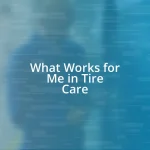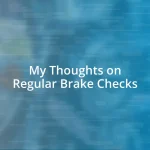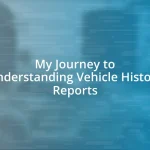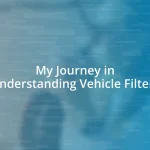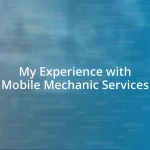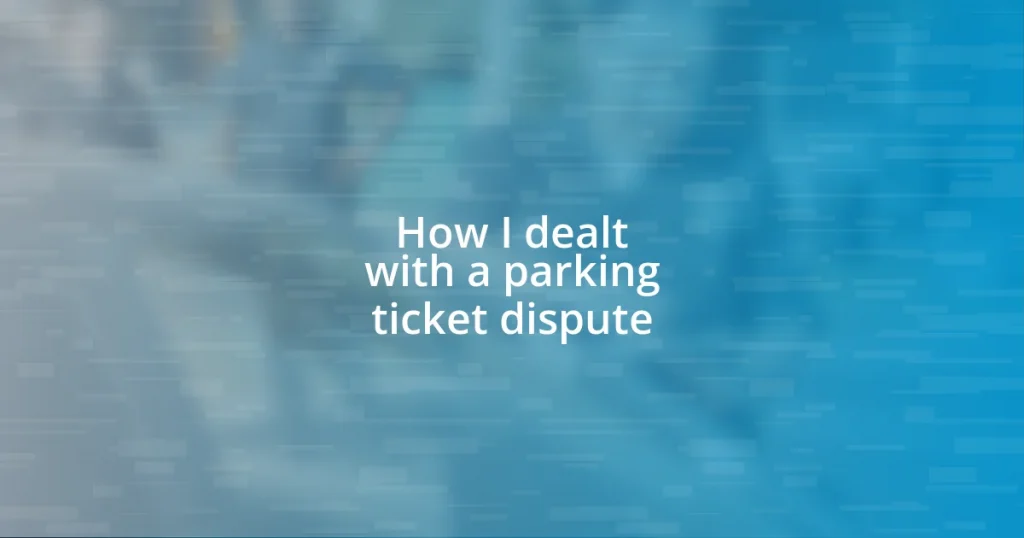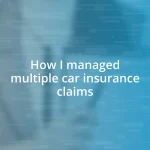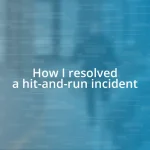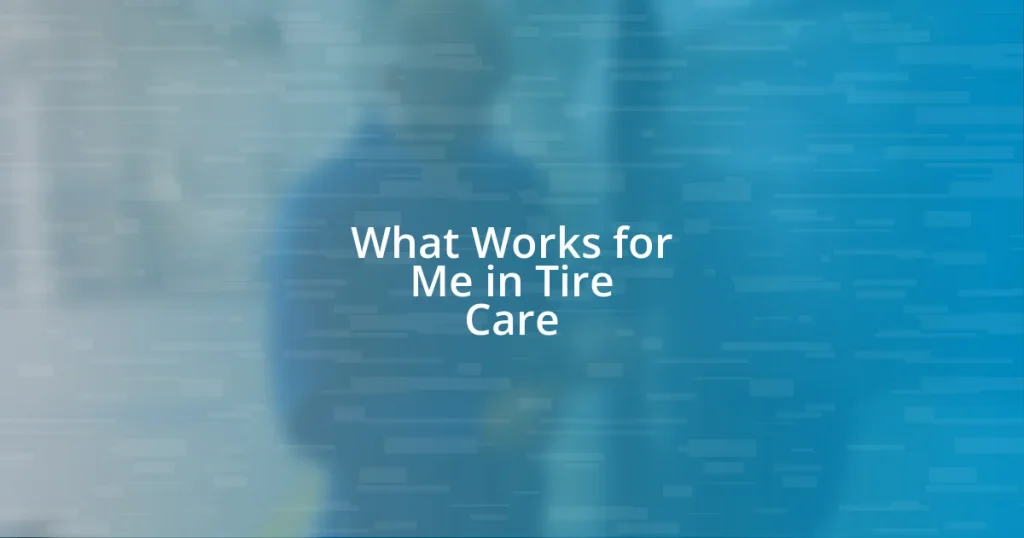Key takeaways:
- Parking ticket disputes often arise from ambiguous signage, incorrect ticket details, and misunderstandings of local regulations.
- Effective dispute preparation includes gathering evidence, researching rules, and crafting a clear, concise appeal letter that conveys facts and personal feelings.
- Maintaining a polite and persistent approach during the appeal process, including following up on submissions and adhering to deadlines, increases the chances of a successful outcome.
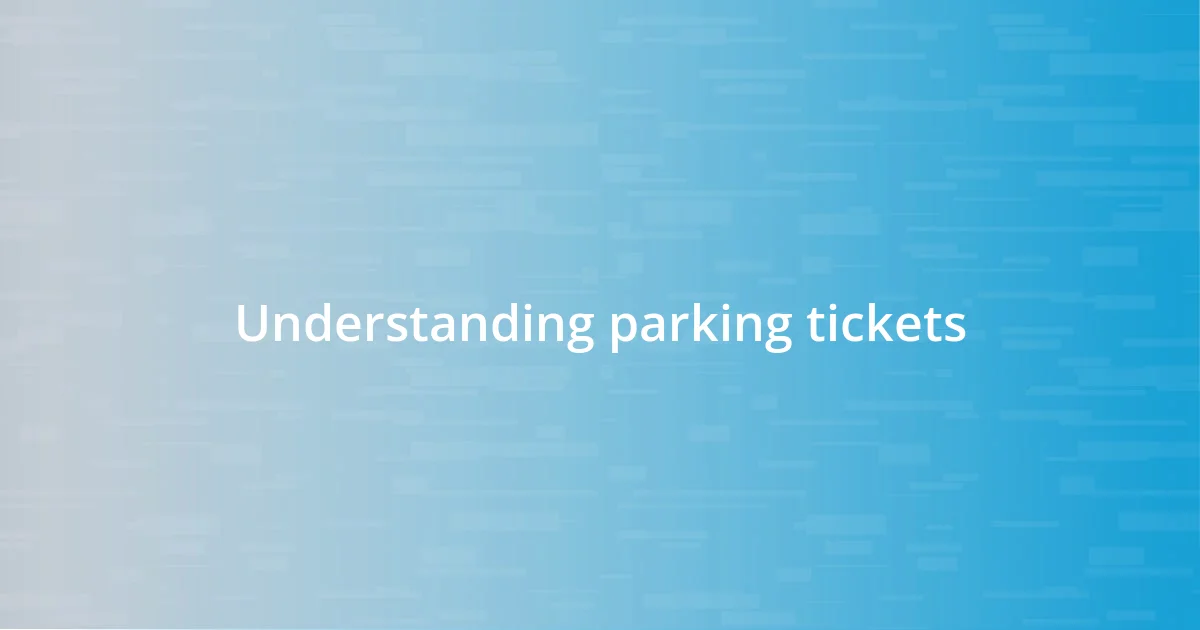
Understanding parking tickets
Parking tickets can sometimes feel like a personal affront. I remember the sinking feeling I had when I saw the bright orange slip flapping under my windshield wiper. It’s frustrating to think you parked legally, only to end up in a dispute over a ticket that seems unjust. Have you ever questioned whether the parking rules were even clear?
The unwritten rules of parking can be as confusing as traffic laws. I’ve experienced that gnawing uncertainty, standing next to my car, scanning the street signs multiple times. It can leave you wondering, “Did I miss something?” Understanding the nuances of where and when to park is essential, yet I often find that parking regulations can vary dramatically from one location to another. This inconsistency can make even the most diligent drivers anxious.
Most importantly, parking tickets aren’t just about the fine; they can affect your sense of fairness. When I challenged a ticket, I didn’t just want my money back; it was about taking a stand against what I perceived as an unfair system. What’s your experience with advocating for yourself in situations like this? It can feel empowering when you realize you have the right to question a ticket that you feel is unwarranted.
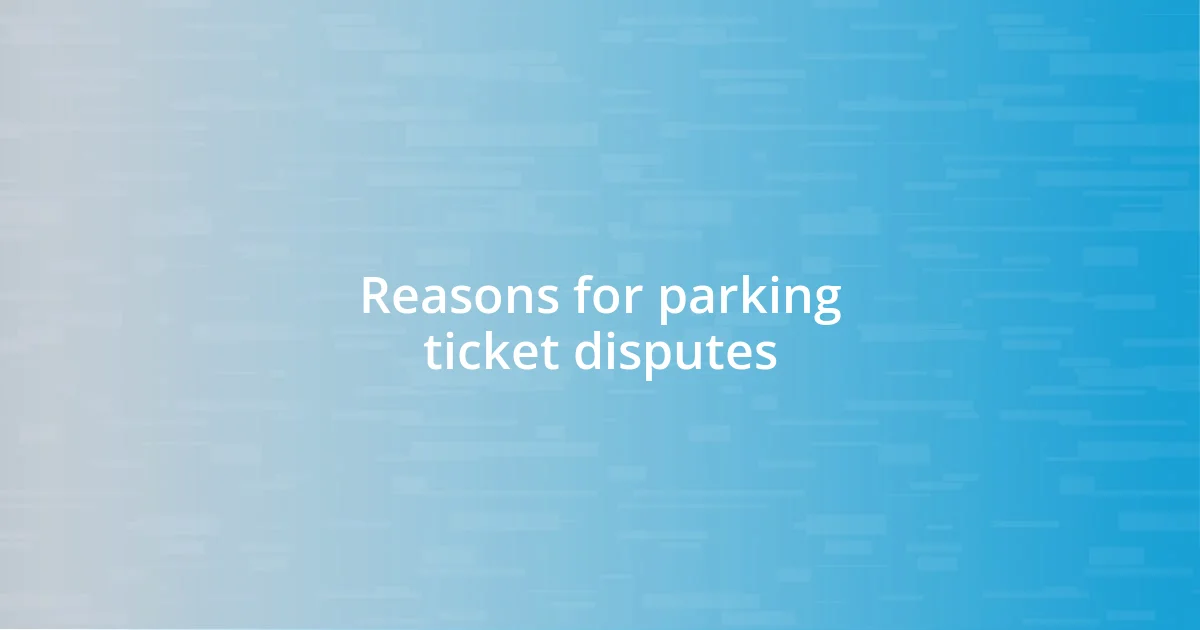
Reasons for parking ticket disputes
When it comes to parking ticket disputes, a variety of factors can ignite a frustrated burst of energy. I’ve found that confusion over parking signage is often at the heart of these disagreements. There was a time I parked right outside a coffee shop, convinced I was in a legal spot, only to discover the signage was partially obscured by a tree. It felt like being caught in a trap I didn’t see coming.
Here are some common reasons people dispute parking tickets:
- Ambiguous Signage: Poorly marked or unclear signs can lead to genuine misunderstandings.
- Incorrect Ticket Information: Sometimes, the details on the ticket, like the make or model of your vehicle, can be wrong.
- Permitted Areas: Disputes can arise if someone is parked in what they believe is a designated free parking zone, especially during special events.
- Time Limits: Confusion about time limits can lead to unintended violations, often leading to disputes.
- Roadwork or Obstructions: Temporary restrictions due to construction can catch drivers off guard, disrupting their parking plans.
I can’t help but feel frustrated when legitimate reasons for a dispute, like these, go unrecognized by authorities. It’s a reminder that we’re not all trying to cheat the system; sometimes, life just throws a curveball!
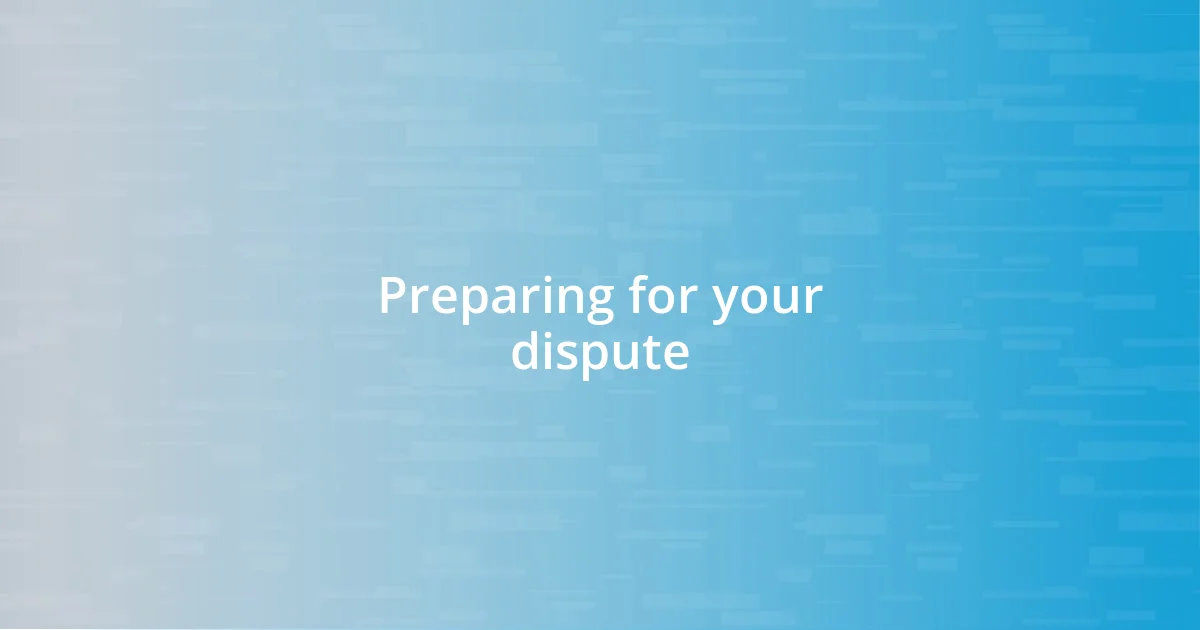
Preparing for your dispute
Preparing for a parking ticket dispute requires careful organization and a bit of strategy. I remember when I faced such a situation; my first step was gathering all relevant evidence. This included photographs of the parking area, signage, and even a record of my parking meter receipts. It was like putting together a scrapbook of my defense, and honestly, piecing it together made me feel more in control of a frustrating situation.
As I delved deeper into the dispute, I found it helpful to understand the specific rules and regulations governing parking in my local area. Researching online or even visiting the local parking authority’s website can illuminate things like permitted parking zones and hours. This knowledge became my ally, empowering me to challenge the ticket knowledgeably and with confidence. Have you ever lost a ticket and then found it again? I felt a mix of relief and anger when I found mine, as that minor moment of setback became a pivotal part of my preparation.
With all the details in hand, I crafted a clear and concise statement outlining why I believed the ticket was issued in error. I aimed to keep it objective and factual while still conveying my genuine feelings about the situation. Sometimes, sharing a bit of personal experience or the emotions involved can resonate with the officials reviewing your dispute. It’s about making them see it from your perspective.
| Preparation Step | Description |
|---|---|
| Gather Evidence | Take clear photos of the parking area and any signs, along with receipts if applicable. |
| Research Rules | Look up local parking regulations to understand the context of your dispute. |
| Craft Your Statement | Create a concise, factual argument that also reflects your feelings about the ticket. |
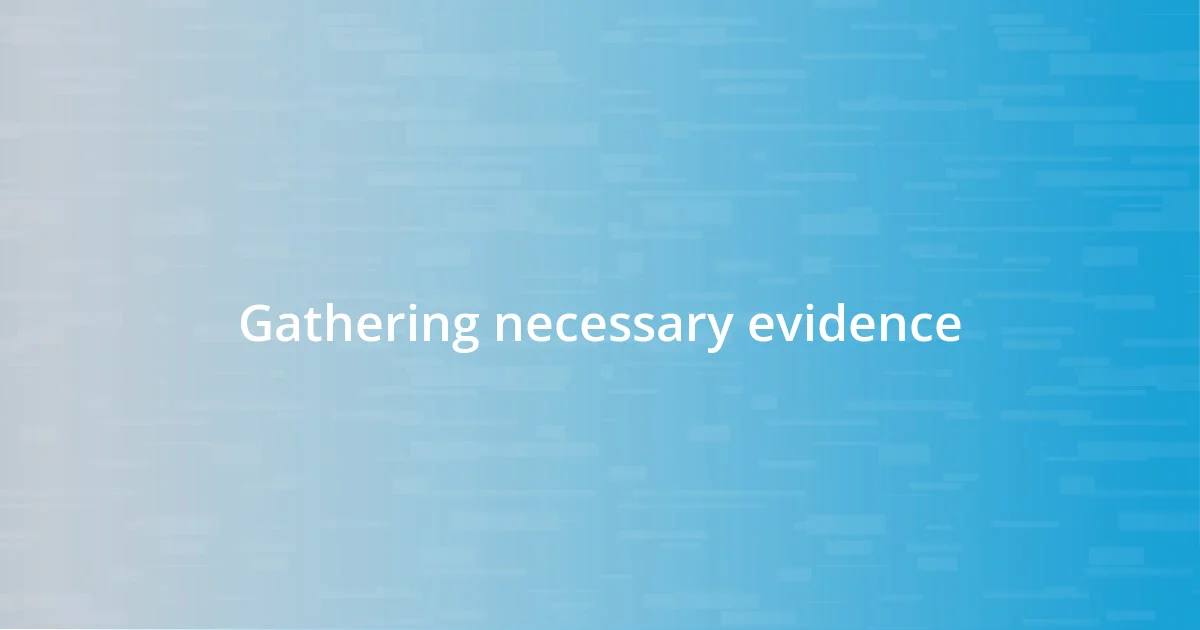
Gathering necessary evidence
It might sound a bit tedious, but gathering evidence is the linchpin of a successful parking ticket dispute. I remember one instance where I took multiple photos from various angles. The aim was to capture not just the obscured signage, but to also show how far away it was from the actual parking space. It really hit home for me how visual evidence could tell a story that words alone couldn’t.
It’s not just about snapping pictures, though; keeping track of any communication with parking authorities is crucial. There was a time I documented each email I sent and received, along with the date and time I called them for clarification. This meticulousness not only built my case, but it also gave me peace of mind. Have you ever had a moment where you wished you had taken notes to back up your claim? I’ve been there, and I learned the hard way the importance of every little detail.
Also, consider gathering testimonies from witnesses if you can. Having a friend who was with me during one parking debacle helped immensely when I provided their account of the unclear signage. It felt empowering to have someone else validate my experience, and that little bit of support made all the difference in how I approached my case. Remember, evidence isn’t just proof; it’s a way to convey your story to those who hold the power to overturn your ticket.
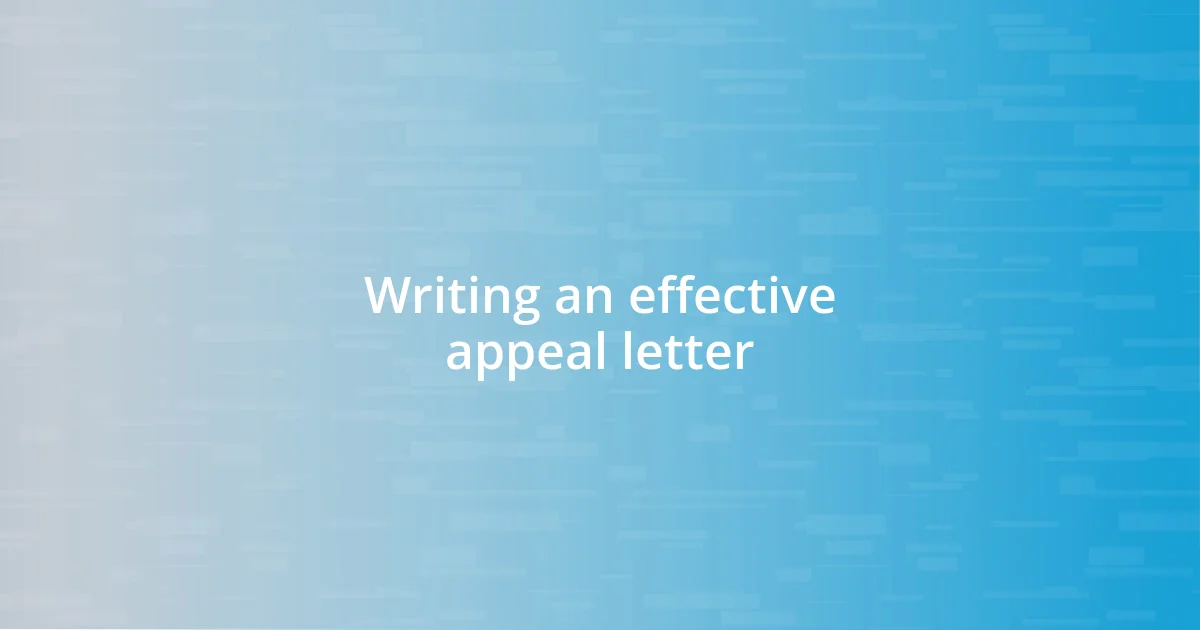
Writing an effective appeal letter
When writing an effective appeal letter, it’s crucial to be clear and direct. I learned this the hard way during my first dispute; my initial letter was filled with emotions, but it lacked focus. After some reflection, I realized that officials appreciate brevity and clarity—it’s about showing that you have a solid case, not just feelings. Keeping my letter to the point helped convey my arguments effectively.
In crafting my appeal, I emphasized specific details from my evidence that supported my claim. I remember highlighting the exact times on my parking receipts and including photographs that illustrated the unclear signage. It’s like presenting a well-structured argument—one that tells a compelling story while being rooted in facts. Does that make sense? When you can pinpoint every relevant detail, you make it harder for the reviewer to dismiss your case.
Finally, I made sure to end my letter with a polite request for reconsideration. There’s something about a respectful tone that helps establish a rapport, even in a dispute. I never forgot to express appreciation for their time and consideration, which I believe often helps my case stand out. After all, we’re all human, and a little kindness can go a long way in the most unexpected situations.
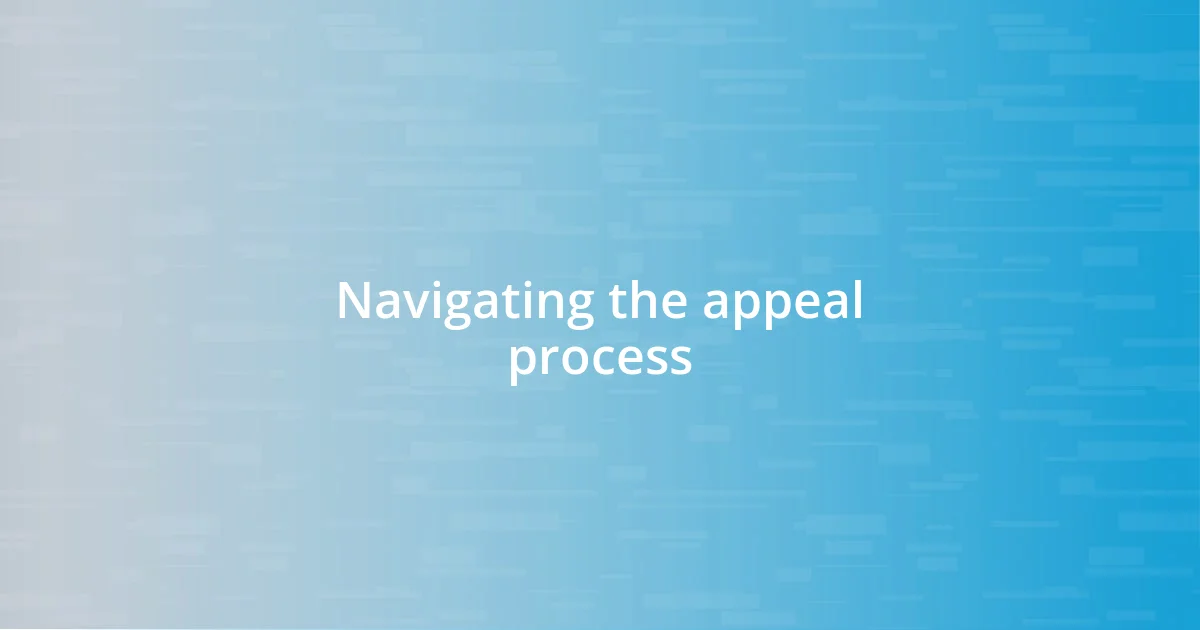
Navigating the appeal process
Navigating the appeal process can feel like stepping into uncharted territory, but I found it essential to remain patient and persistent. When I submitted my appeal, I took the time to understand the specific guidelines provided by the parking authority. It struck me how important it was to adhere to their format and deadlines; one missed detail could derail my efforts. Have you ever felt that anxiety when ticking boxes, hoping to meet requirements? I certainly did, but it became a learning experience to stay organized.
Once I submitted my appeal, I didn’t just sit back and hope for the best. I tracked my submission through emails and confirmation receipts. This proactive approach gave me a sense of control over an otherwise stressful situation. There was that moment I received an acknowledgment of my appeal, and I felt a wave of relief wash over me. It’s a small step, but knowing that my case was under review energized my determination to succeed.
I also learned the value of following up. If weeks went by without a response, I reached out for updates. This not only demonstrated my seriousness but also kept my case fresh in their minds. I remember making that call—it felt a bit daunting, but I reminded myself that I was advocating for myself. Have you ever needed a nudge to take the next step? I get it; sometimes it just takes that initial push to keep fighting for what’s right.

Tips for a successful outcome
When navigating a parking ticket dispute, it’s critical to gather and present all relevant evidence effectively. I recall taking time to scan every corner of the parking lot where I received the ticket, snapping photos of signs and their position that might have contributed to the misunderstanding. Have you ever thought about how something as simple as a blurry sign can completely shift the judgment? It’s about crafting your narrative with clarity, so bringing these visuals into your appeal can significantly strengthen your case.
Timing is everything in the appeal process, and I found out quickly that submitting everything promptly could make or break your chances. After my first submission, I kept my calendar marked with deadlines, treating them like appointments I couldn’t miss. I remember the day I double-checked the dates and felt a rush of relief knowing I was on track. How often do we underestimate the power of preparation? A well-timed submission shows respect for the process and helps prevent unnecessary delays.
Employing a friendly yet assertive tone in communication can also pave the way for favorable outcomes. When drafting emails or making calls, I made it a point to maintain a cordial attitude, even when discussing frustrating issues. This strategy reminded me of the saying, “you catch more flies with honey.” Engaging respectfully has its merits; it humanizes the appeal, making it easier for the reviewer to empathize with your situation. Have you ever noticed how a simple change in tone can alter the course of a conversation? It does wonders, especially in disputes where emotions can run high.

